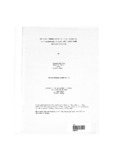The rural informal sector in Kenya: a study of micro-enterprises in Nyeri, Meru, Uasin Gishu and Siaya Districts

View/
Date
12-11-12Author
Ng'ethe, Njuguna
Wahome, James G.
Ndua, Gichiri
Metadata
Show full item recordMore info.
Ng'ethe, Njuguna, Wahome, James G. and Ndua, Gichiri. (1989) The rural informal sector in Kenya: a study of micro-enterprises in Nyeri, Meru, Uasin Gishu and Siaya Districts. Occasional Paper 54, Nairobi: Instituite for Development Studies, University of Nairobihttp://opendocs.ids.ac.uk/opendocs/handle/123456789/828
106282
Publisher
Institute for Development Studies, University of Nairobi
Subject
Economic DevelopmentDescription
Like its urban counterpart, the rural informal sector is
dominated by trade activities and without significant regional differences.
Furthermore it appears that "trade" has the least potential
for growth and therefore labour absorption.
The rural informal sector is in addition dominated by male
"sole proprietors" with basically primary level education and no
"further training" after graduating from school. This raises questions
about their potential trainability, and the means of training them.
In designing policies for the rural informal sector, it would
be good to keep in mind that the rural informal sector is not significantly
different from the urban informal sector except perhaps in the
positive public image that the rural informal sector seems to enjoy.
Furthermore, except for few subtle differences which might lead to major
difference in the future, no significant regional differences exist.
The degree to which the potential of this sector can be increased
will depend on how well and how fast the constraints affecting
productivity in this sector are overcome. Chief among the constraints
are credit, skills and infrastructure. Initial education is only a
constraint indirectly.
The demand for rural informal sector products, though not
systematically covered in this study, could be a major constraint in
that without increased incomes from agriculture this demand is likely
to react positively to increased demand.
On the whole, it seems to us that the faith in the informal
sector could be slightly misplaced given the overall potential of this
sector as documented in this study. However, the evidence is mixed,
showing as it does that, the faith in manufacturing and services subsectors
is certainly more justified as it is cheaper to create more
jobs in these sub-sectors.
Rights
http://creativecommons.org/licenses/by-nc-nd/3.0/Institute for Development Studies, University of Nairobi
